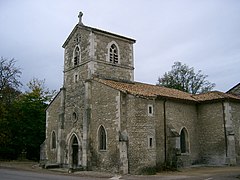Domrémy-la-Pucelle
You can help expand this article with text translated from the corresponding article in French. (July 2024) Click [show] for important translation instructions.
|
Domrémy-la-Pucelle | |
|---|---|
 The town hall in Domrémy-la-Pucelle | |
| Coordinates: 48°26′35″N 5°40′33″E / 48.4431°N 5.6758°E | |
| Country | France |
| Region | Grand Est |
| Department | Vosges |
| Arrondissement | Neufchâteau |
| Canton | Coussey |
| Intercommunality | CC Ouest Vosgien |
| Government | |
| • Mayor (2020–2026) | Véronique Thiot[1] |
Area 1 | 8.99 km2 (3.47 sq mi) |
| Population (2021)[2] | 85 |
| • Density | 9.5/km2 (24/sq mi) |
| Time zone | UTC+01:00 (CET) |
| • Summer (DST) | UTC+02:00 (CEST) |
| INSEE/Postal code | 88154 /88630 |
| Elevation | 268–407 m (879–1,335 ft) (avg. 270 m or 890 ft) |
| 1 French Land Register data, which excludes lakes, ponds, glaciers > 1 km2 (0.386 sq mi or 247 acres) and river estuaries. | |
Domrémy-la-Pucelle (French pronunciation: [dɔ̃ʁemi la pysɛl] ⓘ, lit. 'Domrémy [of] the Maid'; German: Remshausen) is a commune in the Vosges department in Grand Est in northeastern France.
The village, originally named Domrémy, is the birthplace of Joan of Arc. It has since been renamed Domrémy-la-Pucelle after Joan's nickname, la Pucelle d'Orléans ("the Maid of Orléans").
Geography
[edit]Domrémy is positioned along the Upper Meuse Valley, 4 km (2.5 mi) north of the town of Coussey. The village land includes a small wooded hill to the west of the houses, which rises to a height of 407 metres (1335'), known as the Domrémy Wood. This overlooks the small adjacent settlement of Les Roises.
History
[edit]Domrémy and Greux were exempted from taxes "forever" by Charles VII in 1429. It was the sole request made of the king by Joan of Arc when Charles asked her how he could show her his appreciation for seeing him crowned; Joan felt that taxes burdened the villagers. Moreover, he wished to do a good deed for her success in fighting the English during the Hundred Years' War. Taxes were imposed upon Domrémy and Greux again during the French Revolution; the residents have paid taxes since.[3][4]
Until 1766, Domrémy was part of the Duchy of Bar (within a section of the duchy which owed fealty to the Crown of France although the other half of the duchy was part of the Holy Roman Empire).[5] In that year, the Duchy, part of which had become a fief of the Kingdom of France in 1301, escheated to the crown fully upon the death of its last duke, Stanisław Leszczyński.
Demographics
[edit]| Year | Pop. | ±% p.a. |
|---|---|---|
| 1968 | 225 | — |
| 1975 | 222 | −0.19% |
| 1982 | 199 | −1.55% |
| 1990 | 182 | −1.11% |
| 1999 | 167 | −0.95% |
| 2007 | 154 | −1.01% |
| 2012 | 134 | −2.74% |
| 2017 | 104 | −4.94% |
| Source: INSEE[6] | ||
Gallery
[edit]-
Birthplace of Joan of Arc
-
Basilica of Bois Chênu
-
Countryside around Domrémy-la-Pucelle
-
Church of St. Remi of Rheims in Domrémy-la-Pucelle
See also
[edit]References
[edit]- ^ "Répertoire national des élus: les maires" (in French). data.gouv.fr, Plateforme ouverte des données publiques françaises. 13 September 2022.
- ^ "Populations légales 2021" (in French). The National Institute of Statistics and Economic Studies. 28 December 2023.
- ^ "Famous Foreign Coronations" by Agnes and Jessie Wishart Brown The English Illustrated Magazine No. 224 (May 1902), p. 108; via Google Books; retrieved May 21, 2017
- ^ "The Calm Before the Storm" Yanks: The Epic Story of the American Army in World War I by John Eisenhower; The Free Press (2001), p. 98; via Google Books; retrieved May 21, 2017
- ^ "Chapter II" Joan of Arc by Francis Cabot Lowell; Houghton Mifflin Company (1896), p. 16; via Google Books; retrieved May 21, 2017
- ^ Population en historique depuis 1968, INSEE








